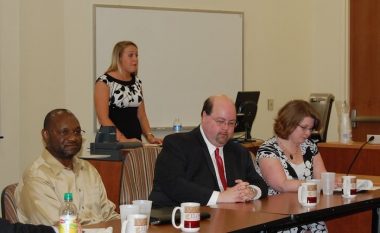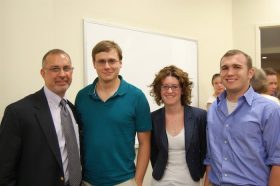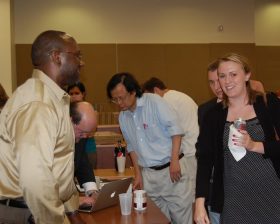Elon Law's Innocence Project and the undergraduate chapter of Phi Alpha Delta at Elon University cosponsored an April 20 forum entitled "Wrongful Convictions and Innocence: Racism and the SBI Audits." The forum featured Daryll Hunt, exonerated of rape and murder charges after more than 19 years in prison, and three distinguished attorneys engaged in innocence and justice initiatives.

In addition to Hunt, the forum, featured Mark Rabil, Wake University School of Law’s Innocence and Justice Clinic Director, attorney Mike Klinkosum, who won a declaration of innocence for Gregory F. Taylor, and Kelly Deangelus, staff attorney at the Center for Death Penalty Litigation, who was co-counsel with Klinkosum in the successful effort to overturn the conviction of Floyd Brown.
In 1984, Daryll Hunt, an African-American man from Winston-Salem, North Carolina, was wrongfully convicted of the rape and murder of a young white newspaper copy editor, Deborah Sykes, but was later exonerated by DNA evidence. He served more than 19 years in prison before he was freed after review and exoneration. Hunt is now involved in the Innocence Project and has started his own group called the Daryll Hunt Project for Freedom and Justice.
“To be accused of something and put behind bars is the worst feeling—it can’t get much lower,” Hunt said. “You’re here today, and I hope that when you finally get your law degree, you go out and fight, and you don’t take an innocent person’s life. I lost 19 years, 4 months and 19 days in prison. I still dream about prison every night. I still wake up thinking I’m in prison—I hear sounds from prison as I sleep … I hope you’ll do everything you can to treat people the way you would want to be treated because life is so precious, and you can’t get that back. Think about the lives that can be changed and about fairness.”

In addition to serving as an adjunct professor and director of the Innocence and Justice Clinic at Wake Forest University School of Law School, Rabil is an assistant capital defender in Forsyth County. His advocacy led to the release and exoneration of Hunt after 19 years of incarceration. Rabil had been practicing law for four years when he was court-appointed to assist a senior partner in his law firm in representing Hunt. In 2004, he was awarded the Thurgood Marshall Award by the North Carolina Academy of Trial Lawyers for his representation of Hunt.
“If you want to make money, don’t do what we do. If you want to make a difference and change people’s lives—then come join us,” Rabil said at the Elon forum.
In February 2010, Klinkosum and his partner Joseph B. Cheshire V won a declaration of innocence for their client, Gregory F. Taylor, who had been wrongfully convicted of murder and imprisoned for 16 years. The three-judge panel’s ruling was the first time in U.S. legal history that a court of law declared a person “innocent” of the crimes with which he/she has been previously charged and convicted. In June 2010, Klinkosum was awarded the Kellie Crabtree Award for his work in the Taylor case, making him the only attorney to have received that award more than once.
In February of 2008, Deangelus, along with co-counsel Klinkosum, was awarded the American Civil Liberties Union of North Carolina Award, given in recognition of outstanding contributions to advancing civil liberties in North Carolina and for their four year legal battle to win the freedom of Floyd Brown, of Wadesboro, N.C., who was wrongfully charged with murder in 1993 and held on the charges in a state mental hospital for 14 years.

“Sometimes in law school the actual individuals impacted by the criminal justice system can seem like distant characters we read about in case books,” said Kate Shimansky L’13, the newly elected 2011-12 Innocence Project president at Elon Law. “Hearing from individuals like Daryll Hunt, who was wrongfully convicted and served 19 and a half years in prison before being exonerated, remind us of the gross injustices that still occur within our criminal justice system. Attorneys such as Mark Rabil, Mike Klinkosum, and Kelly Deangelus are an inspiration to students who are determined to use their legal training to remedy the inequitable workings of our criminal justice system.”
“This purpose of this panel was to educate the public about flaws in the criminal justice system and spread awareness for the wrongfully incarcerated as a result of those flaws,” said Kelli Ganz ‘11, Elon’s Phi Alpha Delta president. “The attorneys that we featured on this panel all have amazing stories to tell from their successful zealous advocacy. The most unique touch to this panel was the insight given by the exonerated Daryll Hunt who had a tremendous impact, leaving the audience with the thought, ‘it’s not what happens to you, but what you do with it to help others.’”
To set the foundation for the event, HBO award winning documentary, “The Trials of Daryll Hunt” was screened on April 18 in Elon University’s Koury Business Center LaRose Digital Theater.
Elon Law’s Federalist Society and Public Interest Law Society also generously contributed to the event by providing food and refreshments.
“This event was a great opportunity for some of the Elon Law clubs to co-sponsor an event with one of Elon undergrad’s organizations, Phi Alpha Delta,” Shimansky said. “The collaboration between the law school organizations and the undergraduate community is something I’d definitely like to see happen again in the future. It was interesting to speak with some of the undergraduate students who were interested in law school and discuss their perspectives on the criminal justice system based on their studies at Elon.”
By Danielle Appelman, L’12


